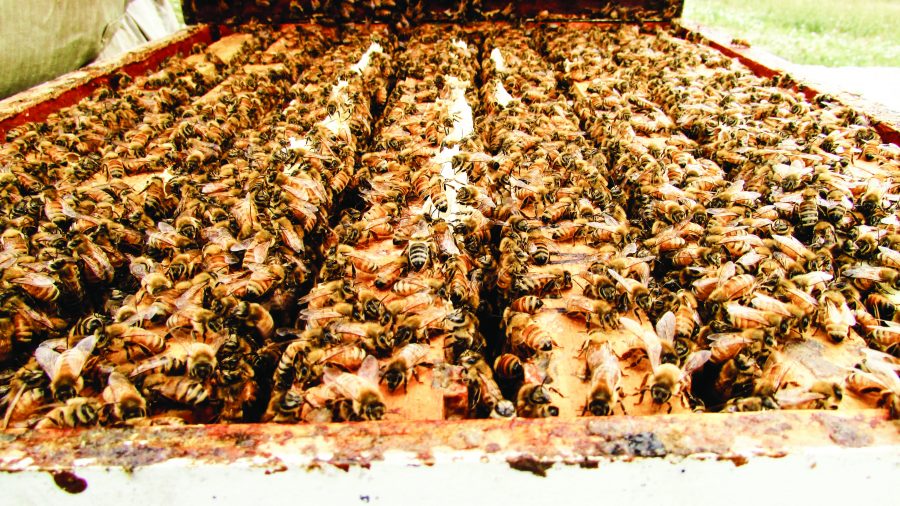Honors Hives Update: Un-bee-lievable Honey
August 28, 2019
The beehive is a symbol of hard work and industry. Not only that, it is the official state emblem of Utah. Beehives make an appearance in Utah’s state flag and the state seal, the Beehive Cluster is recognized as Utah’s official star cluster and the state insect is the beloved honeybee. With Utah’s love for bees and beehives being quite obvious, it is no wonder people here tend to get excited to have access to the bugs’ busy little lives right here at the University of Utah. Students get the chance to look for new ways to save the precious little yellow and black fellas while teaching others the importance of a well-kept beehive in their own backyards.
At the south end of the Marriott Honors Community, bees can be found inside one Langstroth Hive and two “Flow Hives,” one of which was donated by the Flow Hive company from Australia. The flow hives are part of a new beekeeping technology that promises to be less evasive in the bees’ lives and makes it a lot easier to extract honey without the extra mess that usually accompanies it. The beekeepers are able to remove the honey by turning a key that opens up the combs and avoids disrupting the bees in the process.
Because this technology is fairly new, beekeepers do not know how this will change the bees’ lives and patterns yet. Having them at the U allows anyone to study how flow hives changed or did not change the bees’ behavior over time.
Although the purchase of the hives was not meant for research, it is an added benefit that they are at the U for whoever would like to study the bees a little closer. The purpose of the hives is to get students involved in this kind of project, understanding how bees work and how beekeeping is done in an urban area. Being right there at the MHC gives the residents an opportunity to interact with the hives daily, watching them as they cohabit with everyone else.
The bees were put in their new home in April of this year, but they only started producing and harvesting honey about two weeks ago. It is also possible to see the bees through an observation window, allowing students to study the inner workings of these wonderous insects’ daily lives.
According to the Beekeeping Association of the University of Utah’s Facebook page, “The goal of the University of Utah Beekeeper’s Association is to educate people about honeybees and to promote backyard beekeeping at the U and throughout the local community.”
“Our aim is specifically to work through the Honors College to educate honors students about beekeeping,” said Paul Baskin, a resident of the MHC who helped start this particular project.
He explained it is great to talk to people about something he is so passionate about. “I’ve always liked bees, and I decided I was going to get bees a couple of years ago, and then I did at home. … My friend Bridget [Dorsey] and [professor] Christopher Mead at the honors college talked to each other and they asked me about getting this bee initiative started, and they invited me to join on,” he said.
“These hives are such a great opportunity for students to learn about conservation biology and beekeeping, and I think it can be really intimidating to approach beekeeping without having any experience but on-campus is obviously a learning environment,” said Dorsey, who used to live at the MHC and helped start the entire program. “Even if students want to check out the hives one day while we are doing an inspection or something like that, nobody has to commit to beekeeping for the rest of their lives by reaching out to us — we’d love to hear from anyone and everyone about their interests.”
“It’s a very, very fun opportunity,” Baskin said. There is a Canvas page anyone can be added to by asking Baskin or Dorsey, but for more information, Baskin said, “If people want to get involved it’s really easy — go online and look for the Utah Beekeeper’s Association, or follow this article to reach out to Bridget Dorsey or Paul Baskin and we can get you in contact and help you get involved in this project.”
Thanks largely to funding from the Sustainable Campus Initiative Fund, Dorsey and her friends were able to start this amazing journey at the U.
Reach out to Bridget Dorsey [email protected] or Paul Baskin [email protected] with any questions about the beehive program at the MHC.








